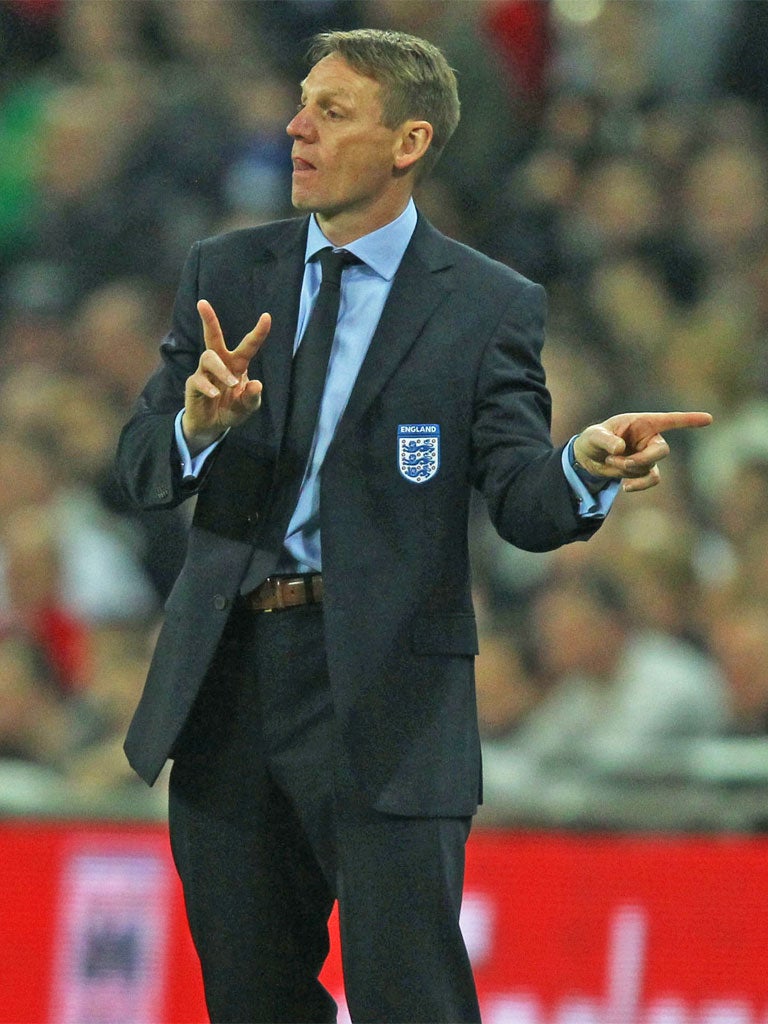Pearce asks himself, what would the great leaders do?
England stand-in coach's 'unselfish' team selection is worthy of respect, if not a victory over the Dutch

For a man who claims to be "pretty lightly raced" in the football management game, the man in the blue suit and brown shoes wasn't short on conviction and the novelty of an England manager confidently articulating the national anthem was just the start.
It was a team in his mould, from the captain with the short, back and sides, to the young boys who have been through the ranks under his tutelage. The only question mark about his first 45 minutes as England manager was how he managed to watch the side he had assembled. He was up and down out of the dugout that often.
Pearce apparently told British troops in Afghanistan during a recent, evidently inspiring, speech at Camp Bastion that "being unselfish" is a quality all great leaders share and he certainly revealed that much in the XI he chose to start with. Granted, his options had not been vast, yet he could have settled for the safety of a more experienced group and put himself first in pursuit of the manager's job. Instead, this was an opportunity for those boys on whom England might depend this summer, which was as wise as it was worthy of respect.
Some of them suggested that Pearce knows his England better than the Fabio Capello who grappled to name the members of the next generation in the ashes of the World Cup campaign, in Rustenburg two summers ago. Micah Richards and, with the exception of the miss which will haunt him today, Daniel Sturridge pretty much proved the manager had judged them right in the course of a first half in which England competed.
There were two moments in five minutes when Scott Parker played the leader's role to sublime perfection. His powerful block on Wesley Sneijder and his tackle of great technical quality as Robin van Persie edged dangerously, left to right, across the England box, made you marvel again at Capello's misjudgment in leaving this player off the plane for South Africa.
Tactically, the set-up was not entirely dissimilar to Capello's: two wide men behind the striker allowing England to make up in attacking numbers what they lacked in quality. Danny Welbeck was Pearce's own twist on that formation – the lone forward also deployed in that role in last summer's European Under-21s Championship in Denmark. Welbeck did little to suggest that he was a better option.
The problem, as England departed to the half-time dressing room with their reputations and that of the temporary manager intact was that you felt that the Netherlands which had been held in check was operating at half pace, and not that interested in the occasion.
The proof of this was brutal when full pace came. The England fans had been lulled into a type of security, their band just starting to blast out "Rule Britannia", when the deadening reality arrived that England are unlikely to enjoy a sovereign reign in eastern Europe this summer. The burst of pace available to Arjen Robben would probably have been well known to Chris Smalling, since DVDs of how he eliminated Manchester United in the 2010 Champions League for Bayern Munich probably form part of the Old Trafford education process. He and Gary Cahill were the men who let Robben tear Pearce's hopes asunder as he cut them apart.
In the instant when those two were beaten again – by Klaas-Jan Huntelaar's thunderous header – the notion of Pearce's England boys offering a fresh start was entirely deconstructed. This looked like a defence which called for John Terry, the one in whom Capello so fatefully trusted.
England's late rally was remarkable, which said something for Pearce's powers of inspiration. But the thought which lingers, after Robben struck back with such nonchalance, is that this reconstituted England are not ready to strike fear into the continent's best this summer. As the visiting manager Bert van Marwijk put it: "We had the possibility of playing football against England and we like to play football."
The next time they play, England will be heady on that pre-tournament elixir of optimism. Harry Redknapp risks damage to his hallowed reputation if he leads the England mission too soon. Perhaps he would be wise to leave it to the man with the blue suit and brown shoes.
Subscribe to Independent Premium to bookmark this article
Want to bookmark your favourite articles and stories to read or reference later? Start your Independent Premium subscription today.

Join our commenting forum
Join thought-provoking conversations, follow other Independent readers and see their replies